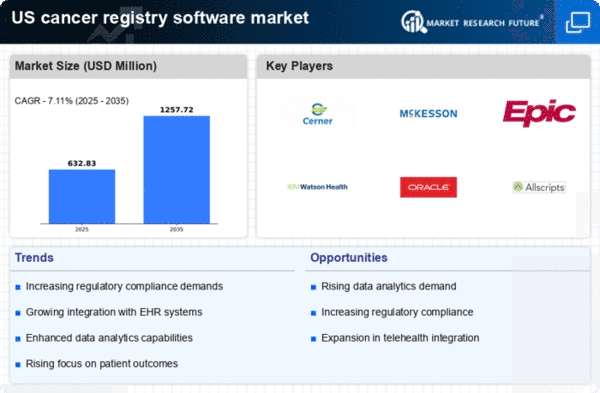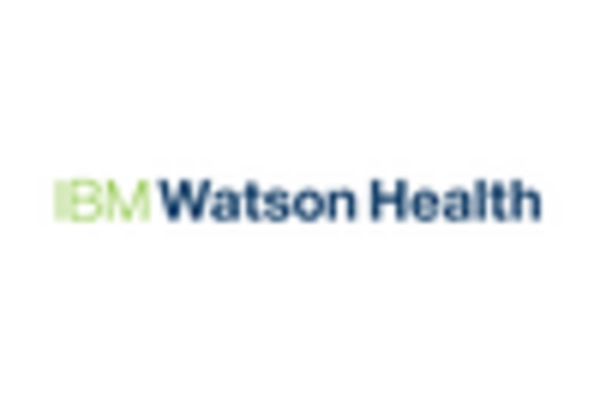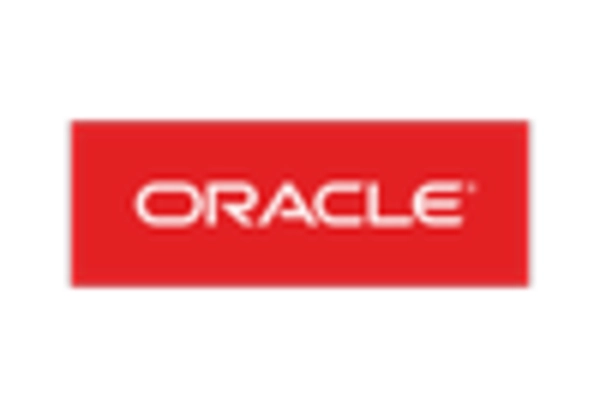Advancements in Data Analytics
The cancer registry-software market is experiencing growth due to advancements in data analytics technologies. Enhanced analytical capabilities allow healthcare providers to derive actionable insights from vast datasets, improving patient care and treatment outcomes. The integration of sophisticated analytics tools into cancer registry software enables users to identify trends, track treatment efficacy, and optimize resource allocation. As healthcare organizations increasingly recognize the value of data-driven decision-making, the demand for software that incorporates advanced analytics is expected to rise. This trend suggests a promising future for the cancer registry-software market, as organizations seek to leverage data for improved healthcare delivery.
Increasing Cancer Incidence Rates
The rising incidence of cancer in the US is a primary driver for the cancer registry-software market. According to the National Cancer Institute, the number of new cancer cases is projected to reach approximately 1.9 million by 2025. This surge necessitates efficient data management and tracking systems, which cancer registry software provides. As healthcare providers and institutions strive to improve patient outcomes, the demand for robust software solutions that can handle large volumes of data is likely to increase. Furthermore, the need for accurate reporting and analysis of cancer trends is essential for public health initiatives, thereby propelling the growth of the cancer registry-software market.
Integration of Telehealth Services
The integration of telehealth services into cancer care is influencing the cancer registry-software market. As telehealth becomes more prevalent, there is a need for software solutions that can seamlessly incorporate data from remote consultations and treatments. This integration allows for comprehensive patient records and enhances the ability to track patient outcomes over time. The cancer registry-software market stands to benefit from this trend, as healthcare providers seek solutions that can adapt to the changing landscape of cancer care. The potential for improved patient engagement and data collection through telehealth initiatives may further stimulate market growth.
Growing Emphasis on Research and Clinical Trials
The cancer registry software market is being propelled by a growing emphasis on research and clinical trials. As the US healthcare landscape evolves, there is an increasing need for comprehensive data to support clinical research initiatives. Cancer registries play a crucial role in providing the necessary data for researchers to evaluate treatment outcomes and develop new therapies. The National Cancer Institute has reported a significant increase in clinical trials, which necessitates efficient data management systems. Consequently, the demand for cancer registry software that can support these research efforts is likely to grow, further driving the market.
Regulatory Compliance and Reporting Requirements
Stringent regulatory frameworks in the US healthcare sector are driving the cancer registry-software market. Organizations are required to comply with various federal and state regulations, including the Cancer Registry Amendment Act, which mandates the collection and reporting of cancer data. Failure to comply can result in significant penalties, thus incentivizing healthcare providers to adopt advanced software solutions. The cancer registry-software market is expected to benefit from this trend, as these systems facilitate compliance by automating data collection and reporting processes. As regulations evolve, the need for adaptable and compliant software solutions will likely become even more pronounced.
















